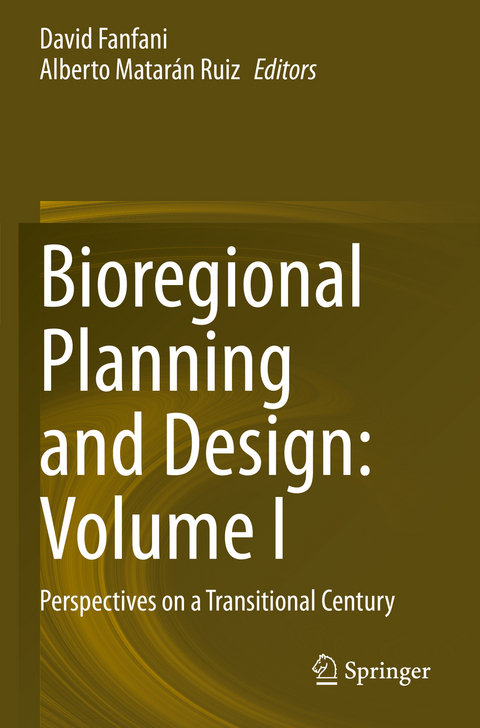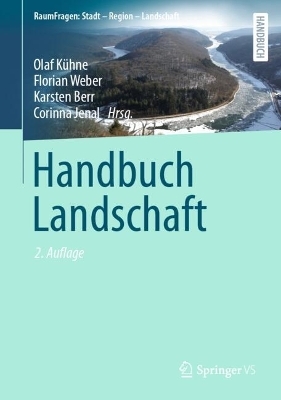
Bioregional Planning and Design: Volume I
Springer International Publishing (Verlag)
978-3-030-45872-0 (ISBN)
This book provides a review of the bioregionalist theory in the field of spatial planning and design as a suitable approach to cope with the growing concerns about the negative effects of metropolization processes and the need for a sustainable transition. The book starts out with a section on rethinking places for community life, and discusses the reframing of regional governance and development as well as social justice in spatial planning. It introduces the concept of the urban bioregion, a pivotal concept that underpins balanced polycentric spatial patterns and supports self-reliant and fair local development. The second part of the book focuses on planning, and particularly on the issues that arise from the 'circular' recovery of the relation between city and agro-ecosystems for integrated planning and resilience of settlements and discusses topics such as foodshed planning, biophilic urbanism and the integration of rural development and spatial planning. This volume sets out the reference framework for Volume II which deals with more specific and operational issues related to spatial policies and settlement design.
lt;p>David Fanfani (PhD) is Associate Professor in Urban and Regional Planning at the Department of Architecture at the Florence University, Italy. He teaches Master Science Course in Regional Planning and Design and Master Science in Architecture of Florence's Architecture School. His research activity focuses especially on analysis and design on the regional scale, addressing mainly matters related to peri-urban areas and their reconnection between city and countryside. He applies an integrated and cross-disciplinary bio-regional approach aimed at the recovery of a co-evolutionary relations between urban and rural domain. He is author of many publications and scientific papers on these subjects at Italian as well as international level. He is also editor in chief of Contesti. Città territori e Progetti, Journal of Urban and Regional Planning and Design, of the Architecture Department of Florence University.
Alberto Mataràn Ruiz is BsC and PhD in Environmental Science at the University of Granada, Spain, and MsC Waste Management at the University of Central Lancashire, UK. Professor of Urban and Regional Planning at the University of Granada. Visiting scholar in different international universities and professor in several postgraduate programs including Urban and Regional Planning, Agroecology, Environmental History and International Cooperation. His research interest is centred on local self-sustainability including the importance of periurban areas and local food systems. According to this his methodological approach is based on an agroecological and decolonial perspective and considers the importance of participation for the transition processes in Europe and Latin America.
Chapter 1. Introduction: Bioregional planning. Relocalizing cities and communities for a post oil civilization.- Chapter 2. A bioregional Bridge Across the Urban Rural-Divide.- Part I: Rethinking places for community life.- Chapter 3. The urban bioregion in the territorialist approach.- Chapter 4. Rearticulating the economy from the local level: towards an economy rooted in caring for life. Chapter 5. Bioregion and spatial configurations. The co-evolutionary nature of the urban ecosystem. Chapter 6. Social justice in spatial planning: which contribution of bioregionalism?.- Part II: Fields for (re)framing planning in bioregional sense.- Chapter 7. Bioregional Planning and Biophilic urbanism.- Chapter 8. Co-evolutionary recovery of the urban/rural interface: policies, planning and design issues for the urban bioregion.- Chapter 9. Agriurban commons. Which resistance and adaptation processes to metropolization?.- Chapter 10. Rural-urban relations as assemblages: a conceptual frameworkfor urban food policies.- Chapte 11. Looking forward: some opportunities and challenges for bioregional planning in current policies and planning framework.- Chapter 12. Short Glossary.
| Erscheinungsdatum | 23.07.2021 |
|---|---|
| Zusatzinfo | XI, 199 p. 35 illus., 33 illus. in color. |
| Verlagsort | Cham |
| Sprache | englisch |
| Maße | 155 x 235 mm |
| Gewicht | 332 g |
| Themenwelt | Naturwissenschaften ► Geowissenschaften ► Geografie / Kartografie |
| Sozialwissenschaften ► Politik / Verwaltung ► Staat / Verwaltung | |
| Sozialwissenschaften ► Soziologie | |
| Schlagworte | Agro-ecosystems • Bioregional planning • Co-Evolution • Cross-disciplinary planning and design • Places stewardship • Polycentric spatial patterns • Self-reliance • Urban bio-region • Urban-rural interface |
| ISBN-10 | 3-030-45872-5 / 3030458725 |
| ISBN-13 | 978-3-030-45872-0 / 9783030458720 |
| Zustand | Neuware |
| Haben Sie eine Frage zum Produkt? |
aus dem Bereich


